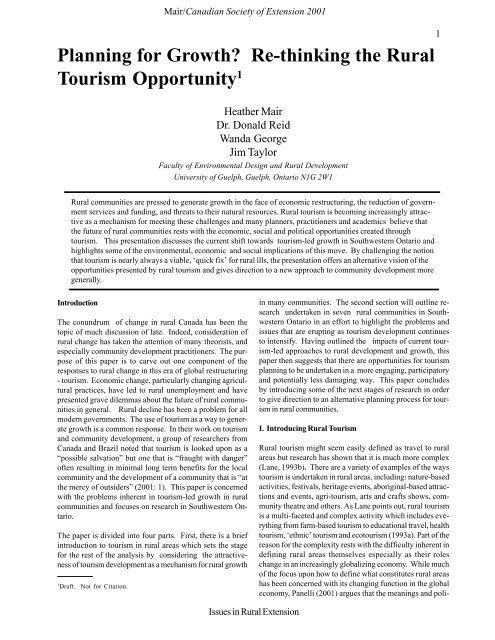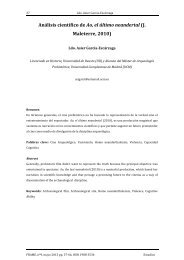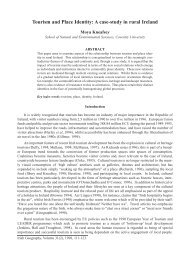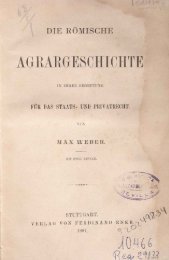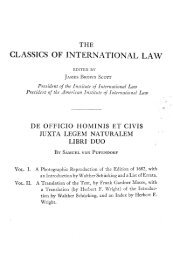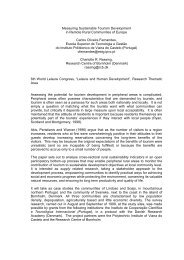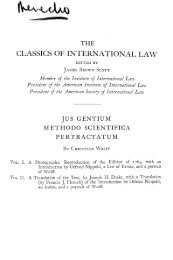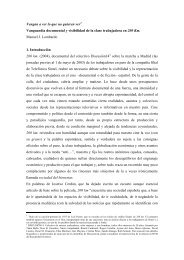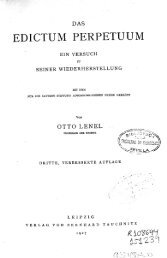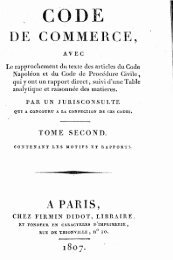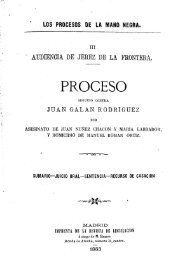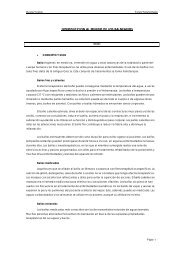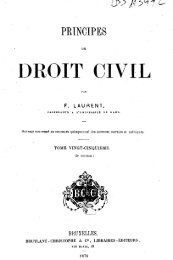Planning for Growth? Re-thinking the Rural Tourism Opportunity1
Planning for Growth? Re-thinking the Rural Tourism Opportunity1
Planning for Growth? Re-thinking the Rural Tourism Opportunity1
Create successful ePaper yourself
Turn your PDF publications into a flip-book with our unique Google optimized e-Paper software.
Mair/Canadian Society of Extension 2001<br />
<strong>Planning</strong> <strong>for</strong> <strong>Growth</strong>? <strong>Re</strong>-<strong>thinking</strong> <strong>the</strong> <strong>Rural</strong><br />
<strong>Tourism</strong> Opportunity 1<br />
Hea<strong>the</strong>r Mair<br />
Dr. Donald <strong>Re</strong>id<br />
Wanda George<br />
Jim Taylor<br />
Faculty of Environmental Design and <strong>Rural</strong> Development<br />
University of Guelph, Guelph, Ontario N1G 2W1<br />
1<br />
<strong>Rural</strong> communities are pressed to generate growth in <strong>the</strong> face of economic restructuring, <strong>the</strong> reduction of government<br />
services and funding, and threats to <strong>the</strong>ir natural resources. <strong>Rural</strong> tourism is becoming increasingly attractive<br />
as a mechanism <strong>for</strong> meeting <strong>the</strong>se challenges and many planners, practitioners and academics believe that<br />
<strong>the</strong> future of rural communities rests with <strong>the</strong> economic, social and political opportunities created through<br />
tourism. This presentation discusses <strong>the</strong> current shift towards tourism-led growth in Southwestern Ontario and<br />
highlights some of <strong>the</strong> environmental, economic and social implications of this move. By challenging <strong>the</strong> notion<br />
that tourism is nearly always a viable, ‘quick fix’ <strong>for</strong> rural ills, <strong>the</strong> presentation offers an alternative vision of <strong>the</strong><br />
opportunities presented by rural tourism and gives direction to a new approach to community development more<br />
generally.<br />
Introduction<br />
The conundrum of change in rural Canada has been <strong>the</strong><br />
topic of much discussion of late. Indeed, consideration of<br />
rural change has taken <strong>the</strong> attention of many <strong>the</strong>orists, and<br />
especially community development practitioners. The purpose<br />
of this paper is to carve out one component of <strong>the</strong><br />
responses to rural change in this era of global restructuring<br />
- tourism. Economic change, particularly changing agricultural<br />
practices, have led to rural unemployment and have<br />
presented grave dilemmas about <strong>the</strong> future of rural communities<br />
in general. <strong>Rural</strong> decline has been a problem <strong>for</strong> all<br />
modern governments. The use of tourism as a way to generate<br />
growth is a common response. In <strong>the</strong>ir work on tourism<br />
and community development, a group of researchers from<br />
Canada and Brazil noted that tourism is looked upon as a<br />
“possible salvation” but one that is “fraught with danger”<br />
often resulting in minimal long term benefits <strong>for</strong> <strong>the</strong> local<br />
community and <strong>the</strong> development of a community that is “at<br />
<strong>the</strong> mercy of outsiders” (2001: 1). This paper is concerned<br />
with <strong>the</strong> problems inherent in tourism-led growth in rural<br />
communities and focuses on research in Southwestern Ontario.<br />
The paper is divided into four parts. First, <strong>the</strong>re is a brief<br />
introduction to tourism in rural areas which sets <strong>the</strong> stage<br />
<strong>for</strong> <strong>the</strong> rest of <strong>the</strong> analysis by considering <strong>the</strong> attractiveness<br />
of tourism development as a mechanism <strong>for</strong> rural growth<br />
1<br />
Draft. Not <strong>for</strong> Citation.<br />
in many communities. The second section will outline research<br />
undertaken in seven rural communities in Southwestern<br />
Ontario in an ef<strong>for</strong>t to highlight <strong>the</strong> problems and<br />
issues that are erupting as tourism development continues<br />
to intensify. Having outlined <strong>the</strong> impacts of current tourism-led<br />
approaches to rural development and growth, this<br />
paper <strong>the</strong>n suggests that <strong>the</strong>re are opportunities <strong>for</strong> tourism<br />
planning to be undertaken in a more engaging, participatory<br />
and potentially less damaging way. This paper concludes<br />
by introducing some of <strong>the</strong> next stages of research in order<br />
to give direction to an alternative planning process <strong>for</strong> tourism<br />
in rural communities.<br />
I. Introducing <strong>Rural</strong> <strong>Tourism</strong><br />
<strong>Rural</strong> tourism might seem easily defined as travel to rural<br />
areas but research has shown that it is much more complex<br />
(Lane, 1993b). There are a variety of examples of <strong>the</strong> ways<br />
tourism is undertaken in rural areas, including: nature-based<br />
activities, festivals, heritage events, aboriginal-based attractions<br />
and events, agri-tourism, arts and crafts shows, community<br />
<strong>the</strong>atre and o<strong>the</strong>rs. As Lane points out, rural tourism<br />
is a multi-faceted and complex activity which includes everything<br />
from farm-based tourism to educational travel, health<br />
tourism, ‘ethnic’ tourism and ecotourism (1993a). Part of <strong>the</strong><br />
reason <strong>for</strong> <strong>the</strong> complexity rests with <strong>the</strong> difficulty inherent in<br />
defining rural areas <strong>the</strong>mselves especially as <strong>the</strong>ir roles<br />
change in an increasingly globalizing economy. While much<br />
of <strong>the</strong> focus upon how to define what constitutes rural areas<br />
has been concerned with its changing function in <strong>the</strong> global<br />
economy, Panelli (2001) argues that <strong>the</strong> meanings and poli-<br />
Issues in <strong>Rural</strong> Extension
Mair/Canadian Society of Extension 2001<br />
2<br />
tics of change in rural areas are as important as <strong>the</strong> economic<br />
shifts that seem to generally characterize <strong>the</strong>ir function. Considerations<br />
of tourism and travel to rural areas, <strong>the</strong>n, are also<br />
complicated.<br />
The context within which rural tourism has developed is a<br />
useful starting point <strong>for</strong> this discussion. Travel to rural areas<br />
has grown <strong>for</strong> two inter-related reasons: on <strong>the</strong> ‘demand’<br />
side, people are becoming increasingly interested in rural<br />
areas and heritage tourism; on <strong>the</strong> ‘supply’ side, governments<br />
have been taking initiatives to encourage its development.<br />
While <strong>the</strong> question of travel to rural areas is an<br />
interesting one (see Weiler and Hall 1992), <strong>for</strong> <strong>the</strong> purposes<br />
of this paper, <strong>the</strong> focus is mostly upon <strong>the</strong> role of government<br />
in its development. In Ontario, <strong>the</strong> election of <strong>the</strong> Harris<br />
Conservative government and its ‘Common Sense <strong>Re</strong>volution’<br />
intensified a process of scaling back <strong>the</strong> role of government<br />
in rural community growth and development. The idea<br />
of planning rural communities was generally to be undertaken<br />
from <strong>the</strong> perspective of amalgamated rural municipal<br />
governments who were in charge of much of <strong>the</strong>ir own funding<br />
and development. This shift was not unique to Ontario<br />
and was, as Healey argues, deeply influenced by <strong>the</strong> neoliberal<br />
strategy of promoting entrepreneurial ra<strong>the</strong>r than regulatory<br />
styles of governance (1997; see also Harvey 1989).<br />
As municipal governments in rural communities are pushed<br />
to devise <strong>the</strong>ir own strategies <strong>for</strong> generating funds <strong>for</strong> providing<br />
services, tourism is given increasing credence. This<br />
is <strong>the</strong> case in many places in <strong>the</strong> world. In a 1994 report by<br />
<strong>the</strong> Organization <strong>for</strong> Economic Cooperation and Development,<br />
it was suggested that tourism had a vital role to play in<br />
<strong>the</strong> future of rural development:<br />
For many years a number of rural areas have<br />
been beset by population loss and declining<br />
services. These problems are now exacerbated<br />
by changes that have brought job losses and<br />
falling income to <strong>the</strong> farm sector. In contrast<br />
to this downturn, tourism has blossomed into<br />
a prosperous, fast-growing activity, and has<br />
indeed turned out to be a significant factor <strong>for</strong><br />
economic growth in <strong>the</strong> countries in which it<br />
has developed. It was <strong>the</strong>re<strong>for</strong>e important to<br />
determine whe<strong>the</strong>r tourism’s growth potential<br />
could be harnessed as a strategy <strong>for</strong> rural development,<br />
in particular by drawing upon resurgent<br />
interest in <strong>the</strong> countryside, its traditional<br />
way of life, and landscapes and <strong>the</strong> architectural<br />
heritage....[<strong>Tourism</strong>] has proved to<br />
be a powerful engine <strong>for</strong> economic growth - -<br />
transferring capital, income and employment<br />
from industrial, urban and developed areas to<br />
non-industrial regions. (1994: 5-7)<br />
The relationship between tourism and economic development<br />
is growing both in importance as a development strategy<br />
and a focus <strong>for</strong> research (see Aronsson 2000; Blank<br />
1989; Bouquet and Winter 1987; Britton 1991; Butler et al.<br />
1998; Hall and Jenkins, 1998; Ilbery 1998; Keane 1992; Luloff<br />
et al. 1993; Mitchell 1998 & 2000; Ramaswany and Kluentzel<br />
1998). The next section narrows <strong>the</strong> discussion to <strong>the</strong> experiences<br />
of four rural communities in Southwestern Ontario 2 .<br />
II. <strong>Tourism</strong> Development and Problems in <strong>Rural</strong><br />
Communities 3<br />
Increasing attention is being given to <strong>the</strong> impact of tourism<br />
development on <strong>the</strong> members of rural communities (Bourke<br />
and Luloff 1995; Perdue, Long and Allen 1987 & 1990; Pizam<br />
1978; Smith and Krannich 1998). <strong>Re</strong>search undertaken in<br />
four rural communities in 1999 supports <strong>the</strong>se findings. Interviews<br />
were completed with over 100 respondents from<br />
four rural communities. These four communities were selected<br />
based upon <strong>the</strong>ir position along an adapted version<br />
of Butler’s destination life-cycle model (1980). Care was taken<br />
to identify and interview members of <strong>the</strong> business community<br />
(tourism and non-tourism businesses), concerned residents,<br />
service club representatives and o<strong>the</strong>r community<br />
volunteers, and local politicians. Overall, when asked about<br />
<strong>the</strong> benefits that tourism brought to <strong>the</strong>ir community, respondents<br />
were most inclined to discuss economic factors.<br />
Employment, economic growth, spin-offs such as support<br />
services, and business development were commonly given<br />
as evidence that tourism helps boost <strong>the</strong> rural economy.<br />
When pressed to consider some non-economic benefits, respondents<br />
usually identified examples of community pride,<br />
cultural interaction and education, incentives to keep <strong>the</strong><br />
community neat and tidy, and <strong>the</strong> ability to maintain support<br />
<strong>for</strong> diverse businesses and services.<br />
The overarching purpose of this research was to have<br />
respondents identify issues and concerns related to tourism<br />
development in <strong>the</strong>ir community. Major concerns and issues<br />
resulting from <strong>the</strong> development of tourism included traffic<br />
congestion, noise, <strong>the</strong> lack of access to amenities, <strong>the</strong> lack of<br />
privacy, a feeling of a loss of balance, threats to rural<br />
tranquility, and a fear of losing control of <strong>the</strong> tourism industry.<br />
Conflicts around tourism-related activities also appear to<br />
occur more often in communities where tourism growth has<br />
intensified. These conflicts and anger appear to have been<br />
most often manifested in petitions and town hall meetings,<br />
but <strong>the</strong>y have also been played out in public, face-to-face<br />
confrontations and in open hostility, anti-tourist signage,<br />
and o<strong>the</strong>r <strong>for</strong>ms of vandalism.<br />
Analysis of <strong>the</strong> four areas suggests that tourism communities<br />
place immediate attention on <strong>the</strong> substantive issues which<br />
2<br />
In <strong>the</strong> interest of space, this paper will not discuss <strong>the</strong> methodological<br />
underpinnings of this research. For details, see <strong>Re</strong>id, D.G., J.<br />
Taylor and H. Mair. (2000a) <strong>Rural</strong> tourism development: research<br />
report. School of <strong>Rural</strong> <strong>Planning</strong> and Development, University of<br />
Guelph, Guelph, Ontario.<br />
3<br />
A similar version of this section was presented at <strong>the</strong> 6 th Annual<br />
World Leisure and <strong>Re</strong>creation Congress, Bilbao, Spain, July, 2000.<br />
Issues in <strong>Rural</strong> Extension
Mair/Canadian Society of Extension 2001<br />
3<br />
are causing tensions and community conflict. Most of <strong>the</strong><br />
participants in this study suggested that if <strong>the</strong>y could<br />
address <strong>the</strong> substantive issues including traffic, parking,<br />
consistent business hours and <strong>the</strong> nature of <strong>the</strong> tourism<br />
product (i.e., mass tourism or high-end), <strong>the</strong>n <strong>the</strong>y would<br />
have dealt sufficiently with <strong>the</strong> major irritants. <strong>Re</strong>spondents<br />
in each of <strong>the</strong> study communities expressed that <strong>the</strong> creation<br />
of a tourism plan would be a major step toward solving <strong>the</strong>ir<br />
problems. Through our analysis of <strong>the</strong> decision-making<br />
processes in each of <strong>the</strong> communities, however, it became<br />
clear that <strong>the</strong>re was no identifiable and widely trusted process<br />
<strong>for</strong> making <strong>the</strong> decisions necessary to begin to create this<br />
tourism plan.<br />
<strong>Tourism</strong> development in each of <strong>the</strong> study communities has<br />
moved <strong>for</strong>ward incrementally, and in a direction that has<br />
generally been unplanned and unsupported by residents in<br />
any meaningful way. <strong>Tourism</strong> development that occurs at<br />
<strong>the</strong> whim of local businesses has <strong>the</strong> potential to sow <strong>the</strong><br />
seeds of its own destruction (Mitchell, 1998). Tensions will<br />
develop within <strong>the</strong> community as some members benefit<br />
from tourism and o<strong>the</strong>rs are left out; poorly planned traffic<br />
routes will exacerbate congestion and frustration; <strong>the</strong>re will<br />
be a drop in <strong>the</strong> provision of local services (or an increase in<br />
<strong>the</strong>ir cost); and <strong>the</strong> invasiveness that unchecked tourism<br />
growth can bring to a small community will be increasingly<br />
resented. These community tensions can begin to affect<br />
<strong>the</strong> health (and appeal) of <strong>the</strong> community.<br />
<strong>Re</strong>gardless of whe<strong>the</strong>r respondents saw tourism development<br />
as good <strong>for</strong> <strong>the</strong> community, a necessary evil, or an approach<br />
to development that must be avoided, nearly all respondents<br />
suggested that planning <strong>for</strong> tourism development was an<br />
essential and often neglected activity. <strong>Re</strong>sponses indicated<br />
that undertaking a planning or visioning exercise was<br />
believed to be necessary <strong>for</strong> addressing tourism<br />
development problems and may bridge <strong>the</strong> divides between<br />
those who were in support of unfettered tourism<br />
development, those who accepted limited development and<br />
those who wanted none. Even business owners and those<br />
who stood to gain most directly from intense tourism<br />
development suggested that <strong>the</strong>re should be controls or<br />
guidelines put in place both to ensure consistency and quality<br />
in <strong>the</strong> development of tourism, but also to prevent overdevelopment<br />
which could taint <strong>the</strong> community’s appeal.<br />
Indeed, when asked about potential mechanisms <strong>for</strong><br />
addressing concerns, conflicts and considerations of future<br />
directions, respondents overwhelmingly suggested <strong>the</strong> need<br />
to create a plan. Not working from a community-based<br />
approach, however, can lead to dissatisfied residents whose<br />
attitudes will affect <strong>the</strong> image and tone of community life<br />
and thus risk reducing <strong>the</strong> appeal of <strong>the</strong> area. It is clear that<br />
what is needed in <strong>the</strong> first instance is a process which will<br />
allow <strong>the</strong> various groups in <strong>the</strong> community to confront<br />
collectively <strong>the</strong> irritants which arise as a result of tourism<br />
development. The next section introduces on-going research<br />
in three o<strong>the</strong>r rural communities which is attempting to<br />
develop such a process.<br />
III. Alternative Approaches to <strong>Rural</strong> <strong>Tourism</strong> <strong>Planning</strong><br />
Given <strong>the</strong> issues uncovered in <strong>the</strong> first stage of <strong>the</strong> research,<br />
many questions arise both <strong>for</strong> planners and researchers of<br />
rural tourism. If <strong>the</strong> community is an integral part of <strong>the</strong><br />
tourism product, how might planners create a more integrative<br />
and holistic approach to tourism planning? Some researchers<br />
might consider this to be <strong>the</strong> foundation <strong>for</strong> sustainable<br />
tourism (Hunter, 1997; see also Bramwell and<br />
Sharman 1999). Can <strong>the</strong>re be sustainable rural tourism? How<br />
can it be planned <strong>for</strong>, monitored and controlled? An especially<br />
useful approach to answering <strong>the</strong>se questions is influenced<br />
by <strong>the</strong> work of Hunter (1997). He argues that sustainable<br />
tourism is most effectively used as an “adaptive paradigm”<br />
insofar as it can take different <strong>for</strong>ms in different places,<br />
depending on how one arrives at a balance between <strong>the</strong><br />
perceived needs of <strong>the</strong> community in question, and <strong>the</strong> demands<br />
of <strong>the</strong> tourists visiting <strong>the</strong>m. Hunter sees sustainable<br />
tourism as a continuum (1997: 859-863) wherein a community<br />
could have a ‘tourism imperative’ in that <strong>the</strong>y would<br />
decide which resources would need to be sacrificed in order<br />
to generate income. The o<strong>the</strong>r end of <strong>the</strong> continuum,<br />
‘neotenuous tourism’ or an ecology first perspective, would<br />
actively discourage tourism in an ef<strong>for</strong>t to protect those natural<br />
areas that <strong>the</strong> community wants to protect. This<br />
neotenuous position could be extended beyond ecology<br />
concerns to include <strong>the</strong> preservation of rural community life<br />
and culture.<br />
It is important to note that each step along this continuum<br />
involves a degree of control and preservation, but <strong>the</strong> mix is<br />
decided by <strong>the</strong> community in question and may change over<br />
time. A community that decides to attract an initially large<br />
number of tourists to generate income, <strong>for</strong> instance, may<br />
move along <strong>the</strong> continuum provided that controls (as<br />
determined by <strong>the</strong> community) are in place to safeguard total<br />
destruction until <strong>the</strong>re could be an increased level of<br />
protection or control. Changes in <strong>the</strong> nature of tourism indicate<br />
that tourists may well be accepting of <strong>the</strong> need <strong>for</strong> <strong>the</strong>se<br />
protective measures, and may be willing to take an active<br />
role in encouraging <strong>the</strong>se measures (Hunter, 1997; Aramberri,<br />
2001).<br />
The question remains, of course, of how this might take place.<br />
On-going research with members of three different rural communities<br />
in Southwestern Ontario suggests that an essential<br />
starting point is <strong>the</strong> creation of a community visioning session<br />
which helps to build <strong>the</strong> trust between community members<br />
as all take an equal role in dreaming about <strong>the</strong> future of<br />
<strong>the</strong>ir community. Importantly, <strong>the</strong> focus of this session is<br />
deliberately not on tourism per se but on <strong>the</strong> community<br />
itself. Participants follow <strong>the</strong> model of a search conference,<br />
as set out by Emery and Purser (1996) and spend time drawing<br />
images of <strong>the</strong>ir community, discussing <strong>the</strong>ir drawings<br />
and <strong>the</strong>n making collective decisions about what in <strong>the</strong>ir<br />
Issues in <strong>Rural</strong> Extension
Mair/Canadian Society of Extension 2001<br />
4<br />
community <strong>the</strong>y want to protect, build upon and prevent<br />
from continuing. While this process requires facilitation,<br />
care is taken to ensure that those participating are in control<br />
of all decisions through consensus. The next stages of <strong>the</strong><br />
community visioning exercise involves slotting tourism development<br />
into <strong>the</strong> created vision and devising strategies<br />
about how to reach this goal. While <strong>the</strong> research is still at<br />
early stages, <strong>the</strong>re are many exciting instances of collaboration,<br />
enhanced understanding and mutual respect that <strong>for</strong>m<br />
over <strong>the</strong> course of this particular exercise. Participants in<br />
two of <strong>the</strong>se exercises have determined that it should be<br />
undertaken again with as many people from <strong>the</strong> community<br />
as possible. The challenge remains in terms of engendering<br />
<strong>the</strong> initiative and energy to design a flexible, communitybased<br />
tourism planning process but <strong>the</strong>se first ef<strong>for</strong>ts reveal<br />
a buy-in which helps to ensure <strong>the</strong> momentum is indigenous<br />
and self-directed.<br />
Conclusion<br />
In <strong>the</strong>ir work on collaborative recreation and park services<br />
planning, Hope and Dempsey (2000) have utilised community<br />
decision conferences and conclude that this type of<br />
planning:<br />
should represent what people want, project imaginatively<br />
what might be, and recognize realistically<br />
what is possible. It must also actively<br />
involve <strong>the</strong> stakeholders and seek to<br />
build consensus around shared community<br />
values in order to achieve genuine commitment<br />
to implementation. (p. 63-4)<br />
As researchers and planners investigate <strong>the</strong> role of tourism<br />
in rural development, attention must be paid not just to <strong>the</strong><br />
players in <strong>the</strong> community and <strong>the</strong> importance of inclusivity,<br />
but also on <strong>the</strong> context. As was mentioned earlier, tourism is<br />
being introduced in small communities around <strong>the</strong> world as<br />
<strong>the</strong> quick fix <strong>for</strong> development ills. <strong>Tourism</strong> is being asked to<br />
generate a plethora of benefits <strong>for</strong> communities and thus<br />
must be taken seriously. For example, as part of its rural jobs<br />
strategy and to encourage development in rural areas, <strong>the</strong><br />
provincial government in Ontario earmarked $30 million dollars<br />
<strong>for</strong> rural projects - over $7 million of which went to rural<br />
tourism projects. That number indicates that nearly onethird<br />
of rural development funding is steering rural tourism<br />
growth. The appeal of tourism <strong>for</strong> rural development fits<br />
alongside <strong>the</strong> ideals of entrepreneurial growth insofar as it<br />
means <strong>the</strong> government can take a smaller role. As is shown<br />
above, however, entrepreneurially driven tourism leads to<br />
problems in rural communities and so must be steered much<br />
more carefully than first considered. A long-term approach<br />
to healthy tourism development demands <strong>the</strong> time, resources<br />
and skills to ensure that it is built from consensus and support<br />
and with as many members and perspectives in <strong>the</strong><br />
community as possible. The research described here is a<br />
step in that direction.<br />
<strong>Re</strong>ferences<br />
Aramberri, J. 2001. “The Host Should Get Lost: Paradigms in <strong>the</strong><br />
<strong>Tourism</strong> Theory.” in Annals of <strong>Tourism</strong> <strong>Re</strong>search. Vol. 28.<br />
No. 3. pp. 738-761.<br />
Aronsson, L. 2000. The Development of Sustainable <strong>Tourism</strong>.<br />
London: Continuum.<br />
Blank, U. 1989. The Community <strong>Tourism</strong> Industry Imperative.<br />
Pennsylvania: Venture Publishing.<br />
Bourke, L. and A.E. Luloff. 1995. “Leaders’ Perspectives on <strong>Rural</strong><br />
<strong>Tourism</strong>: Case Studies in Pennsylvania.” in Journal of <strong>the</strong><br />
Community Development Society. Vol. 26. No. 2. 224-239.<br />
Bouquet, M. and M. Winter. (eds). 1987. Who From Their Labours<br />
<strong>Re</strong>st? Conflict and Practice in <strong>Rural</strong> <strong>Tourism</strong>. Aldershot,<br />
England: Avebury.<br />
Bramwell, Bill and Angela Sharman. 1999. “Collaboration in Local<br />
<strong>Tourism</strong> Policymaking.” in Annals of <strong>Tourism</strong> <strong>Re</strong>search.<br />
Vol. 26. No. 2. 392-415.<br />
Britton, S. 1991. “<strong>Tourism</strong>, Capital and Place: Towards a Critical<br />
Geography of <strong>Tourism</strong>.” in Environment and <strong>Planning</strong> D:<br />
Society and Space. Vol. 9. pp. 451-478.<br />
Butler, R.W. 1980. “The Concept of a <strong>Tourism</strong> Area Cycle of<br />
Evolution: Implications <strong>for</strong> Management of <strong>Re</strong>sources.” in<br />
Canadian Geographer. Vol. XXIV. No. 1. 5-12.<br />
Butler, R., M.C. Hall and J.M. Jenkins (eds.). 1998. <strong>Tourism</strong> and<br />
<strong>Re</strong>creation in <strong>Rural</strong> Areas. London: John Wiley and Sons.<br />
Emery, M. and R.E. Purser. 1996. The Search Conference: A Powerful<br />
Method <strong>for</strong> <strong>Planning</strong> Organizational Change and Community<br />
Action. San Francisco: Jossey-Bass.<br />
Hall, C. M. and J.M. Jenkins. 1998. “The Policy Dimensions of <strong>Rural</strong><br />
<strong>Tourism</strong> and <strong>Re</strong>creation.” in R. Butler, C.M. Hall and J.M.<br />
Jenkins (eds.). <strong>Tourism</strong> and <strong>Re</strong>creation in <strong>Rural</strong> Areas. New<br />
York: John Wiley & Sons. pp. 19-42.<br />
Harvey, D. 1989. “From Managerialism to Entrepreneurialism: The<br />
Trans<strong>for</strong>mation in Urban Governance in Late Capitalism.”<br />
in Geografiska Annaler. B (Human Geography). Vol. 71.<br />
No. 1. pp. 3-17.<br />
Healey, P. 1997. Collaborative <strong>Planning</strong>: Shaping Places in<br />
Fragmented Societies. Vancouver: UBC Press.<br />
Hope, D. and S. Dempsey. 2000. “Achieving Consensus in <strong>Planning</strong><br />
<strong>Re</strong>creation and Park Services.” in World Leisure. Vol. 42.<br />
No. 4. pp. 56-64.<br />
Hunter, Colin. 1997. “Sustainable <strong>Tourism</strong> as an Adaptive Paradigm.”<br />
in Annals of <strong>Tourism</strong> <strong>Re</strong>search. Vol. 24. No. 4. 850-867.<br />
Ilbery, B. (ed.). 1998. The Geography of <strong>Rural</strong> Change. Essex,<br />
United Kingdom: Addison Wesley Longman Limited.<br />
Keane, M. 1992. “<strong>Rural</strong> <strong>Tourism</strong> and <strong>Rural</strong> Development.” in H.<br />
Briassoulis and Jan van der Straaten (eds.). <strong>Tourism</strong> and <strong>the</strong><br />
Environment: <strong>Re</strong>gional, Economic and Policy Issues.<br />
London: Kluwer Academic Publishers. pp. 43-56.<br />
Lane, B. 1993a. “What is <strong>Rural</strong> <strong>Tourism</strong>?” in Bramwell, B. and B.<br />
Lane (eds.). <strong>Rural</strong> <strong>Tourism</strong> and Sustainable <strong>Rural</strong><br />
Development. Proceedings of <strong>the</strong> Second International<br />
School on <strong>Rural</strong> Development, 28 June - 9 July. Ireland:<br />
University College Galway. pp. 7-21<br />
Lane, B. 1993b. “Sustainable <strong>Rural</strong> <strong>Tourism</strong> Strategies: A Tool <strong>for</strong><br />
Development and Conservation.” in Bramwell, B. and B. Lane<br />
(eds.). <strong>Rural</strong> <strong>Tourism</strong> and Sustainable <strong>Rural</strong> Development.<br />
Proceedings of <strong>the</strong> Second International School on <strong>Rural</strong><br />
Development, 28 June - 9 July. Ireland: University College<br />
Galway. pp. 102-111.<br />
Luloff, A.E., J.C. Bridger, A.R. Graefe, M. Saylor, K. Martin, and R.<br />
Gitelson. 1993. “Assessing <strong>Rural</strong> <strong>Tourism</strong> Ef<strong>for</strong>ts in <strong>the</strong><br />
United States.” in Annals of <strong>Tourism</strong> <strong>Re</strong>search. Vol. 21.<br />
pp. 46-64.<br />
Mitchell, C.J.A. 1998. “Entrepreneurialism, Commodification and<br />
Creative Destruction: a Model of Post-modern Community<br />
Development.” in Journal of <strong>Rural</strong> Studies. Vol. 14. No. 3.<br />
273-286.<br />
Issues in <strong>Rural</strong> Extension
Mair/Canadian Society of Extension 2001<br />
5<br />
Mitchell, Clare J.A. and Candy Coghill. 2000. “The Creation of a<br />
Cultural Heritage Landscape: Elora, Ontario, Canada.” in The<br />
Great Lakes Geographer. Vol. 7. No. 2. pp. 88-105.<br />
Organisation <strong>for</strong> Economic Co-Operation and Development. 1994.<br />
<strong>Tourism</strong> Strategies and <strong>Rural</strong> Development. Paris: OECD.<br />
94 pp.<br />
Palerno F. (project director). 2000. <strong>Tourism</strong> and Community<br />
Development Case Studies. Halifax, Canada: Faculty of<br />
Architecture, Dalhousie University.<br />
Panelli, R. 2001. “Narratives of Community and Change in a<br />
Contemporary <strong>Rural</strong> Setting: The Case of Duaringa,<br />
Queensland.” in Australian Geographical Studies. Vol. 39.<br />
No. 2. pp. 156-166.<br />
Perdue, R. R., P. T. Long, and L. Allen. 1987. “<strong>Rural</strong> <strong>Re</strong>sident<br />
<strong>Tourism</strong> Perceptions and Attitudes.” in Annals of <strong>Tourism</strong><br />
<strong>Re</strong>search. Vol. 14. 420-429.<br />
Perdue, R. R., P. T. Long, and L. Allen. 1990. “<strong>Re</strong>sident Support <strong>for</strong><br />
<strong>Tourism</strong> Development.” in Annals of <strong>Tourism</strong> <strong>Re</strong>search.<br />
Vol. 17. 586-599.<br />
Pizam, A. 1978. “<strong>Tourism</strong>’s Impacts: The Social Costs to <strong>the</strong><br />
Destination Community as Perceived by its <strong>Re</strong>sidents.” Journal<br />
of Travel <strong>Re</strong>search. Vol. 16. No. 4. 8-12.<br />
Ramaswamy, V.M. and W.F. Kuentzel. 1998. “<strong>Rural</strong> <strong>Re</strong>structuring<br />
and <strong>the</strong> Transition of a <strong>Tourism</strong> Dependent Community.” in<br />
<strong>Tourism</strong> Analysis. Vol. 3. pp. 63-76.<br />
<strong>Re</strong>id, D.G., J. Taylor and H. Mair. 2000a. <strong>Rural</strong> <strong>Tourism</strong> Development:<br />
<strong>Re</strong>search <strong>Re</strong>port. School of <strong>Rural</strong> <strong>Planning</strong> and Development,<br />
University of Guelph, Guelph, Ontario.<br />
<strong>Re</strong>id, D.G., H. Mair and J. Taylor. 2000b. “Community Participation<br />
in <strong>Rural</strong> <strong>Tourism</strong> Development.” in World Leisure Journal.<br />
Vol. 42. No. 2. pp. 20-27.<br />
Smith, M. D. and R. S. Krannich. 1998. “<strong>Tourism</strong> Dependence and<br />
<strong>Re</strong>sident Attitudes.” in Annals of <strong>Tourism</strong> <strong>Re</strong>search. Vol. 25.<br />
783-802.<br />
Weiler, B. and C.M. Hall. 1992. Special Interest <strong>Tourism</strong>. London:<br />
Halstead Press.<br />
Issues in <strong>Rural</strong> Extension


